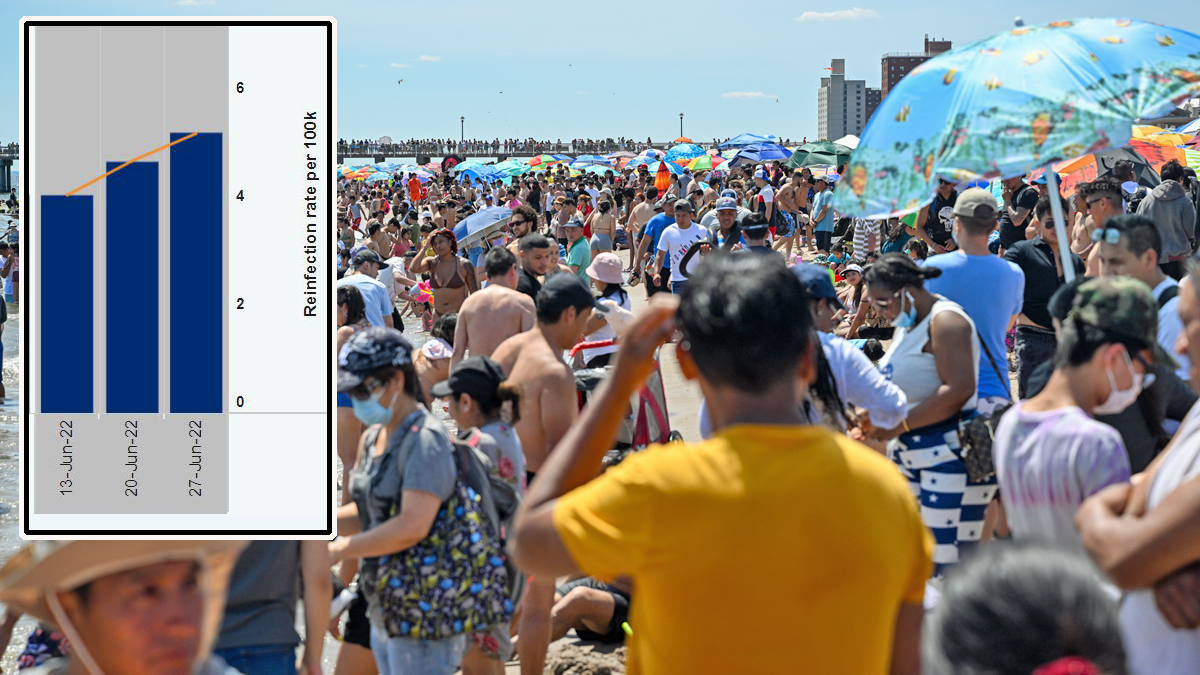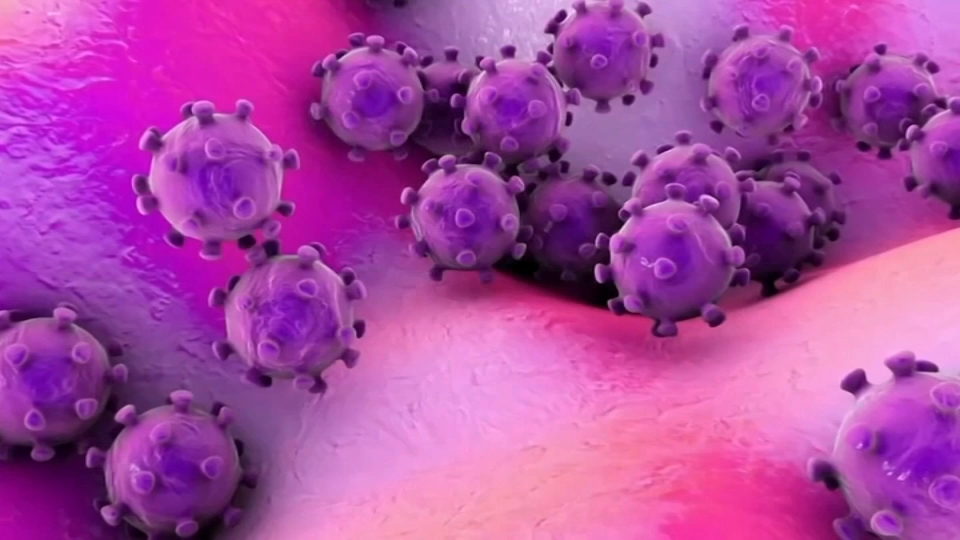What to Know
- COVID cases are surging across America once again, fueled in large part by the highly contagious and more vaccine-resistant omicron subvariants BA.5 and BA.4
- A recent study out of Columbia University found those two subvariants to be 4.2 times more vaccine-evasive than their predecessor; that's likely the reason reinfection rates are rising in some areas, experts say
- Immunity has likely waned considerably for those who haven't been boosted in 2022, Dr. Anthony Fauci says -- and those extra protections are critical given the enhanced reinfection risk associated with the BA.5 strain
You've probably heard about the latest COVID variant by now. And if you haven't here's the deal.
BA.5 first emerged in South Africa and is dubbed by many experts to be the "worst version" of omicron yet." It has proven to be up to 4.2 times more vaccine-resistant than one of its predecessors, BA.2.12.1, which research showed eluded vaccine efficacy at nearly double the rate of the strain that came before it.
It also appears correlated with the risk of reinfection, which is particularly problematic at a time when experts say many Americans may be experiencing diminished immunity from vaccination.
Get Tri-state area news and weather forecasts to your inbox. Sign up for NBC New York newsletters.
This BA.5 is now the dominant strain -- both in the CDC's New York region and nationally, and is believed to be fueling the latest case surge -- what a growing number are calling the sixth pandemic wave -- across the country.
All of New York City is back in the CDC's high-risk category for community COVID spread, positivity rates are at late-January highs and the five boroughs are once again pushing face masks for all indoors regardless of vaccination status. At the same time, the White House is renewing its pleas for COVID precautions, vaccinations and boosters as it acknowledges the threat.
So how threatening is BA.5? Dr. Anthony Fauci, America's leading infectious disease doctor, who tested positive for COVID for the first time last month, made the network TV rounds to talk about it. Here are five key questions culled from his interviews on MSNBC and CNN.
1. How Worried Are You Right Now About BA.5 and Why?
Fauci: It's something we absolutely need to take seriously. It has a transmission advantage over the prior variants that were dominant. The dominant variant was first BA.1, then BA.2, then BA2.12.1, and on and on. And then you get to BA.4, 5, particularly BA.5, which clearly has a transmission advantage which is one of the reasons why we're seeing throughout several regions of the country, including in, particularly, the New York area, you're starting to see cases go up.
The ability to infect an individual is enhanced over prior variants, and that’s the reason why you’re seeing the U.S., where we're reporting 140 or so thousand cases a day, it’s likely a gross underestimate, because so many people get tested with home kits and don’t report it. So we’re probably seeing a multifold greater number than that 140,000. Deaths are still around 300, but hospitalizations are ticking up. This is something you don’t want to panic about, but you really want to pay attention to it, because there are things that we can do to blunt that.
We still don’t have as many people vaccinated as we need, only 67% of the population, only half of those are boosted. We need to be using the mitigations that we have available -- masking where appropriate, vaccinating people who aren’t vaccinating and boosting people who are ready and eligible for their boost. We’re not doing it to the extent that we should be doing it.
2. How Quickly Can You Get Reinfected With BA.5?
Fauci: It varies. Usually, immediately after you’ve been infected, within a period of weeks to a month or so, you're pretty much protected because of the immune response. Some people, and they're outliers, have been documented to be infected weeks to a month after the initial infection. Most of the time, the protection lasts for a few months. But if somebody was infected several months ago, particularly if they were infected with omicron, the protection that's given to you against BA.5 wanes and diminishes pretty rapidly over a period of several months.
Immunity against infection wanes pretty quickly and it goes way, way down. What we’ve been fortunate in is that the immunity against severe disease leading to hospitalization and unfortunately, death in some cases, tends to hold reasonably well. But it's slipping. Where it was up to 90, 80, then it goes down to 70, 75, 65 and 50, then you're really a situation where you really do need a boost. And we know when you get out six, seven months or so out, we're now in July, we’re in the seventh month of the year, most people who have not received a booster this year have a diminished immunity.
3. Should We Be Wearing Masks Again Indoors?
Fauci: The CDC makes it very clear, depending upon the density of infection, the dynamics of infection, in the place where you live. And you see, if you look at the map, where just a couple months of ago, it was a lot of green and some yellow, now we're seeing a fair amount of orange, which means you really should, in an indoor setting, a congregate setting, be wearing masks.
It's just the appropriate thing to do to defend- To protect yourself and your family, and those around you, because you could get infected and inadvertently, without any symptoms, transmit it to someone perhaps in your own household, who’s vulnerable, either an elderly person or someone with immune compromise. And that’s the reason why when you're in an area where the infection dynamic is high, you should wear a mask in a congregate indoor setting.
4. When Might We See a 2nd COVID Booster Approved for Adults?
Fauci: It’s being very seriously and actively considered. We were talking about this just literally every day for the last couple of days. Obviously, this is something that is an FDA regulatory decision. Those are the people most qualified to look at the data and to make a decision whether or not they would extend the regulation to be able to give it to people less than 50.
But I can tell you this is something that is being actively discussed. I can't predict if and when it will happen, but I believe it's going to be within a very reasonable period of time.
More Coverage
5. What Would You Say to Americans Tired of These Protocols?
Fauci: It becomes a hard sell. We don't want people to panic. We don't want this to disrupt their lives the way it has all of us over the last two to two and half years. But you have to remember we're still dealing with an issue. And you can deal with it without necessarily disrupting your way of life, by doing some simple things: getting tested, for example.
Tests are widely available right now. If you're going to a function or you have someone in your family who's a vulnerable person that you want to make sure that you are not exposing yourself to them if you get infected and you might actually not have any symptoms at all. Testing is an important mitigation. The next is vaccination. The next is boosting. And if, in fact, a person does get infected, if you are in a risk group, widely available now are very effective therapies.
The point I'm making is we don't want people to panic and feel, "Oh, my goodness, we want to get this over with and they keep telling us things that we have to do."
What one has to do is really relatively simple, but the dividend of that is extraordinary because you can prevent yourself from getting infected and certainly with the vaccines that we have, they are still very effective in preventing you from progressing to severe disease if you do get infected.
Bonus: How Are You Feeling in Your COVID Recovery? Learn Anything?
Fauci: I'm actually feeling fine, and I think I'm an example of someone who, because of my age, falls into a high-risk category. I was vaccinated, and doubly boosted, and I'm relatively certain that had I not been vaccinated and doubly boosted, I might have had a more severe course than I had. I was fortunate, it was relatively mild. I've completely recovered, thank goodness.
I feel back to normal, but I don't think it would have been that way had I not been vaccinated and boosted.



